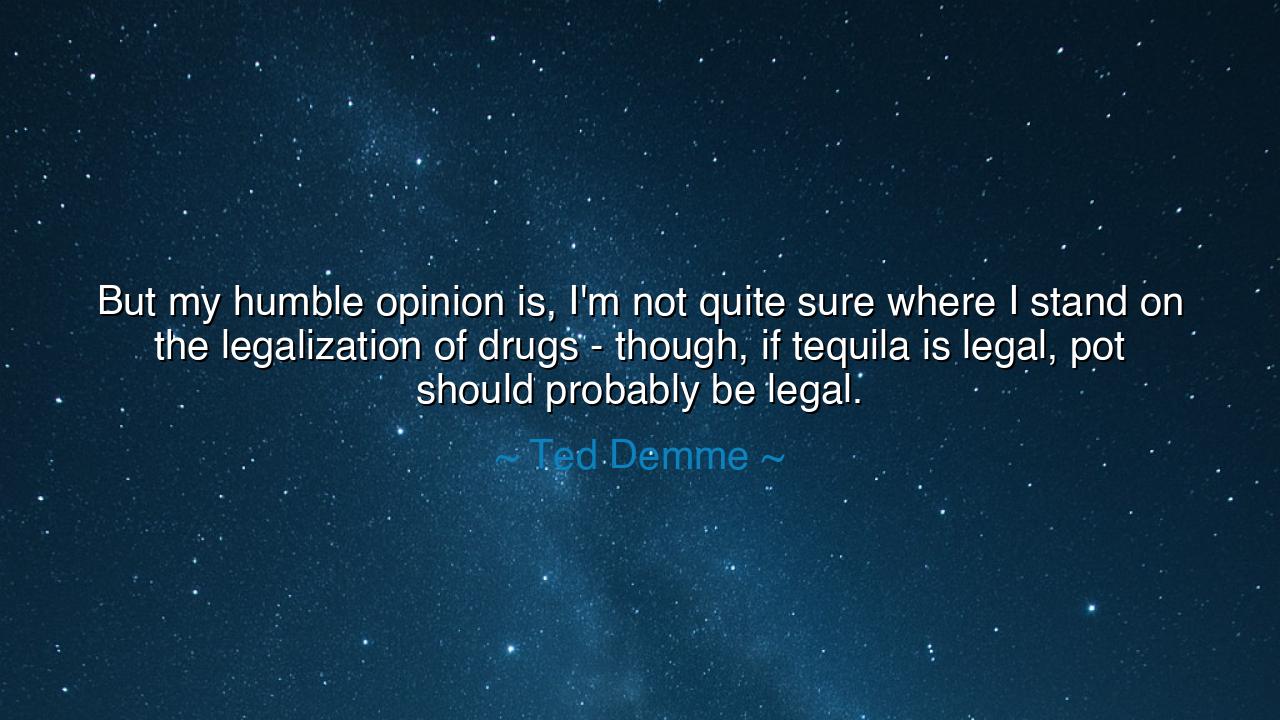
But my humble opinion is, I'm not quite sure where I stand on the
But my humble opinion is, I'm not quite sure where I stand on the legalization of drugs - though, if tequila is legal, pot should probably be legal.






When Ted Demme said, “But my humble opinion is, I’m not quite sure where I stand on the legalization of drugs — though, if tequila is legal, pot should probably be legal,” he spoke not as a politician nor a philosopher, but as a man grappling with one of society’s most enduring paradoxes: the contradiction between law and logic, between what is deemed acceptable by custom and what is condemned by statute. Beneath his casual tone lies a profound truth — that morality and legality do not always walk hand in hand, and that societies, through habit or hypocrisy, often uphold laws that lack harmony with reason or fairness. His words, though humble in form, challenge the listener to question not just the laws of men, but the principles by which those laws are made.
The origin of this quote comes from the reflections of Ted Demme, a filmmaker best known for his work on Blow, a movie that explored the life of drug smuggler George Jung and the rise of America’s cocaine trade. Having lived and worked amid the creative, often rebellious energy of Hollywood, Demme was no stranger to the contradictions of freedom and control, indulgence and restraint. In speaking these words, he did not advocate chaos, nor glorify addiction; rather, he drew attention to the inconsistency in how societies define vice and virtue. Why, he asks indirectly, should one intoxicant — tequila, born of the earth and sold openly — be celebrated, while another — cannabis, equally natural — be condemned? His reflection, simple yet piercing, forces us to see that law without reason is tyranny in disguise.
To understand the depth of his sentiment, one must recall how civilizations throughout history have wrestled with the regulation of pleasure. In ancient times, even the wise Plato warned that moderation, not prohibition, was the key to virtue. The Greeks and Romans drank wine in ceremonies not to escape life, but to honor the gods and reflect upon existence. Yet in later ages, humanity began to replace balance with control, and the spirit of understanding with fear. The great Prohibition Era of the early twentieth century stands as one of history’s most vivid lessons. When the United States outlawed alcohol, crime flourished, corruption spread, and ordinary citizens became criminals overnight. The law, intended to protect morality, instead became a mockery of it — until reason prevailed and the ban was lifted. Demme’s words echo this ancient pattern: that when a society legislates against human nature rather than with it, it breeds hypocrisy instead of harmony.
His mention of tequila is more than casual irony — it is a symbol. Tequila, long associated with joy, celebration, and even recklessness, represents humanity’s timeless dance with intoxication. If a drink that dulls the senses and impairs the mind can be purchased at will, then what is the logic of forbidding cannabis, a plant often praised for its calm and clarity? Demme’s statement thus becomes a mirror held to society, reflecting its inconsistencies and selective morality. He reminds us that laws should not merely punish, but enlighten; they should rise from understanding, not fear. The legalization of drugs, in his view, is not about indulgence, but about fairness — about recognizing that the human desire for altered consciousness is neither new nor evil, but a truth that must be guided, not denied.
There is an ancient parallel in the story of Dionysus, the god of wine and ecstasy, whose worshippers were once condemned as mad. Yet Dionysus symbolized not chaos, but transformation — the freedom of the soul from the rigid boundaries of reason. His cult, misunderstood and persecuted, reflects the same tension between law and liberation that persists today. Just as the followers of Dionysus sought transcendence through wine, modern humanity seeks meaning, relief, or joy through substances that society alternately embraces and rejects. Ted Demme’s words, then, remind us that moral panic is often a mask for moral confusion — that true wisdom lies in distinguishing between use and abuse, between liberty and excess.
Yet, behind his humor, there is also humility — the admission, “I’m not quite sure where I stand.” This uncertainty is not weakness, but wisdom. The ancients taught that the first step toward understanding is to recognize the limits of one’s own knowledge. Demme’s hesitation reveals a rare honesty: that even in an age of bold opinions and rigid ideologies, one may still question, still reflect. His statement is a call for thoughtfulness in public discourse — for societies to move beyond the shouting of extremes, to the quiet work of discernment.
Let the lesson of his words endure: that justice must be consistent, that freedom must be guided by reason, and that no law should exist merely because it has always existed. If society permits one form of intoxication, it must explain — not assume — why another is forbidden. The wise do not seek a world without laws, but a world whose laws reflect truth. And truth, as Ted Demme saw it, is not written in dogma, but discovered in dialogue — in the courage to ask uncomfortable questions.
Thus, his reflection becomes more than a musing on tequila and pot; it becomes a meditation on the eternal balance between law, liberty, and the human spirit. For when a people cease to question their laws, they cease to be free. And when they learn to align justice with reason — to temper law with compassion and clarity — then they will have built not merely a legal system, but a civilization worthy of its humanity.






AAdministratorAdministrator
Welcome, honored guests. Please leave a comment, we will respond soon